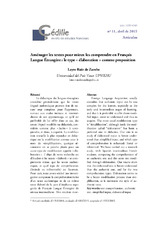Aménager les textes pour mieux les comprendre en Français Langue Étrangère : le type « élaboration » comme proposition
Autor
Ruiz de Zarobe, Leyre
Editor
UCOPressFecha
2015Materia
Compréhension textuelleTexte authentique
Input
Simplification
Élaboration
Text comprehension
Authentic text
Simplified input
Elaborated input
METS:
Mostrar el registro METSPREMIS:
Mostrar el registro PREMISMetadatos
Mostrar el registro completo del ítemResumen
La didactique des langues étrangères considère généralement que les textes (input) authentiques peuvent être de nature trop complexe pour l’apprenant, surtout aux stades initiaux et intermédiaires de son apprentissage, et qu’il est préférable de lui offrir dans ce cas, des textes (input) modifiés ou didactisés, considérés comme plus « faciles » à comprendre, et donc, à acquérir. La modification textuelle la plus répandue en didactique est la modification connue sous le nom de «simplification», quoique récemment on se penche plutôt pour un autre type de modification appelée « élaboration ». L’objet de notre recherche est d’étudier si les textes « élaborés » se comprennent mieux que les textes authentiques, et quel type de compréhension (littérale ou inférentielle) est favorisée. Pour ceci, nous avons réalisé une investigation comparant la compréhension écrite d’un texte authentique et de ce même texte élaboré de la part d’étudiants espagnols de Français Langue Étrangère de niveau intermédiaire. Nos resultats montrent que le texte élaboré se comprend mieux que l’authentique et qu’il favorise les deux types de compréhension. L’« élaboration » se révèle une modification préférable à la simplification, car elle maintient le style des textes authentiques. Foreign Language Acquisition usually considers that authentic input can be too complex for the learner, especially at the early and intermediate stages of learning, and that it is preferable to offer them modified input, easier to understand and thus to acquire. The most usual modification type is “simplification”, although lately the modification called “elaboration” has been a preferred one in didactics. Our aim is to study if elaborated input is better understood than simplified input, and which type of comprehension is enhanced: literal or inferential. We have carried out a research study, with Spanish intermediate French students, comparing the comprehension of an authentic text and this same text modified through elaboration. Our results show that the elaborated text is better understood than the authentic one, and for the two comprehension types. Elaboration seems to be a better modification process than simplification, as it maintains the style of authentic texts.

